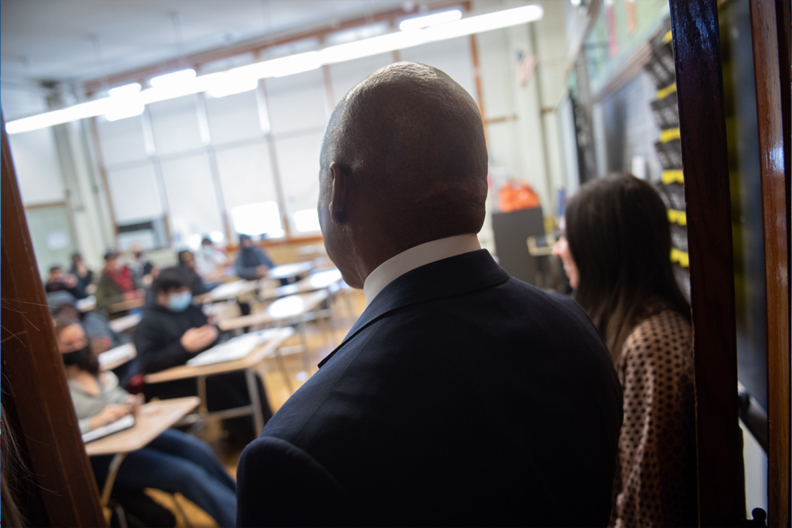How to Make NYC Schools More Democratic, Even Under Mayoral Control
Mayoral control has achieved, at best, mixed results.

Over the past 20 years, the largest and most diverse school system in the country has been under the control of just three men: former New York City Mayors Michael Bloomberg and Bill de Blasio, and current Mayor Eric Adams.
Mayoral control has achieved, at best, mixed results for New York’s students and, for years, there have been calls to make the system more democratic and accountable. One of the best ways to do that is by reforming the City’s Board of Education, known colloquially as the Panel for Educational Policy (PEP), which Albany has a chance to do this year.
The History and Results of Mayoral Control
Bloomberg pitched mayoral control of schools as a reform to the sprawling bureaucracy of the city school district, promising to bring efficiency, standardization, and accountability to a system that had too little of each. But it has not delivered on those promises.
While test scores initially improved when schools were transferred to Bloomberg’s control, achievement and opportunity gaps have persisted. National research shows that in mayor-controlled school districts, these gaps grow even wider, suggesting our students’ outcomes will worsen still.
As education became centralized under mayoral control, responsiveness and transparency to parents and students suffered. As standardization rolled out across the system, the authority of talented school leaders to innovate was diminished. And rather than bringing education to the forefront of city policymaking, mayoral control has often pushed it to the backburner, especially under the influence of our current mayor.
Theoretically, making education the purview of the mayor raises its prominence as an issue for voters. While school board elections are notoriously low-turnout, mayoral elections command the attention of most New Yorkers, even those who can’t or don’t vote. But, when it competes with mayoral candidates’ other priorities, we’ve seen that education easily fades into the background.
Albany lawmakers must also listen to their constituents who are asking for changes to improve transparency and accountability.
As a candidate, Mayor Adams had hardly anything to say about school policy. According to the People’s Plan scorecard of mayoral candidates, Adams either had no position or was categorized as “neutral” on nine out of 12 education policy issues.
Since his inauguration, Mayor Adams has failed to demonstrate that education is a top priority. He has barely mustered a policy argument to retain mayoral control and has failed to meet with lawmakers to adequately make his case. This is itself a signal that lawmakers should heed.
Given mayoral control’s mixed reviews, it’s a good thing that state lawmakers have resisted calls to extend it permanently. The debate ignited every time the statute sunsets is healthy for our schools and our democracy. Indeed, mayoral control should not be granted for a four-year term but should be extended incrementally, and only if the mayor can demonstrate vision and success. City schools can’t be the fiefdom of any one politician.
Albany lawmakers must also listen to their constituents who are asking for changes to improve transparency and accountability.
Giving Schools More PEP
Current proposals could give parents more say and make school policy more democratic by reforming the Panel for Educational Policy (PEP). This is New York’s school board, and it takes important votes on policy and budget matters. Under current law, the mayor has near total control over the PEP, including the ability to appoint and fire a majority of members at will.
Adams’ PEP has been the source of more controversy than in years past, demonstrating why unilateral control is problematic.
To start with, the administration sent its appointees to their first meeting without ever disclosing their identities to the public. Several weeks later, when their names were officially released, one member was fired after her record of anti-gay viewpoints became public (but not before she had already participated in votes). Her seat still has not been filled, which contributed to the Panel’s shocking rejection of a major funding proposal last month (the mayor’s appointees were expected to support his proposal). This flies in the face of Mayor Adams’ argument that mayoral control brings “stability and surety” to schools.
New York lawmakers should seriously consider proposals to reform this body.
One improvement would be to allow additional public officials like the public advocate, comptroller, and local Education Councils to make appointments to the Panel. This would ensure more voices are represented in education decision-making. Additionally, fully vetted members should serve a term of at least one year and be removable only for cause, eliminating the threat that they can be suddenly fired for disagreeing with the mayor.
To ensure that school policy isn’t subsumed by political interests, a majority of PEP seats should be reserved for people with demonstrated ties to public schools, like current or retired educators, public school parents, staff, and recent graduates. Student members of the Panel should be granted the same voting rights as every other member.
To increase transparency, PEP meetings must be better publicized, more welcoming, and more easily accessible for those who don’t speak English or who have disabilities. If meetings are held virtually, panel members must be able to be seen, heard, and understood as they vote and as people are testifying (in addition, accessibility services for people with disabilities must be provided). PEP members should also hold public forums across New York City in between formal meetings to be sure families always have access.
The flaws of our mayoral control system have been widely understood for two decades. We don’t have to keep ignoring them. To inject some democratic accountability into the system, Albany should reform the PEP and extend mayoral control for less than four years.
